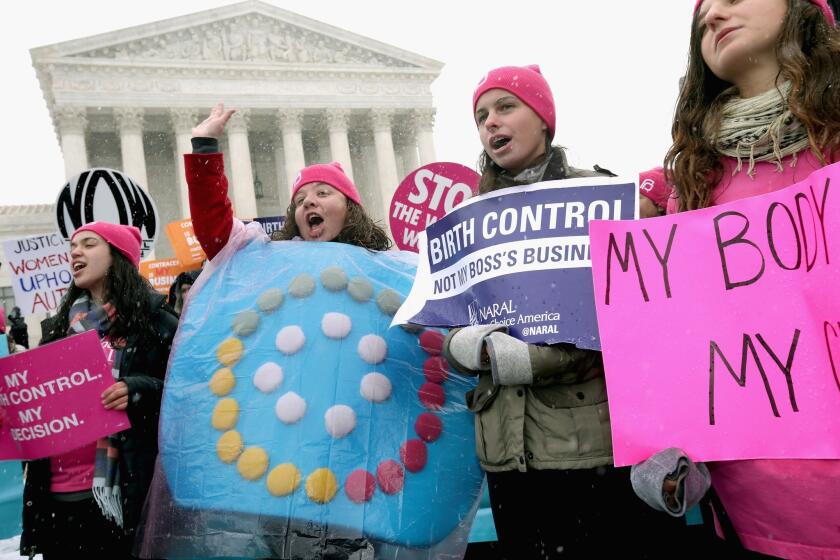Opinion: The Supreme Court needs to rescue birth control access from the Trump administration
- Share via
The Supreme Court on Wednesday heard arguments on whether the Trump administration went too far in allowing employers to obtain exemptions on religious or moral grounds from a requirement to include contraceptive coverage for women in their insurance plans. But once again, the realities of how employer-based insurance functions seemed lost in the debate.
Which is too bad. Because, objectively, those realities make clear that there’s no rationale for the exemptions that the Trump administration provided.
The case before the justices concerns the mandate in the Affordable Care Act that new health insurance policies cover certain preventive services with no out-of-pocket costs. Among those services were, “with respect to women, such additional preventive care and screenings ... as provided for in comprehensive guidelines supported by the Health Resources and Services Administration.” The HRSA’s guidelines specify a number of birth control methods, and that’s where the trouble starts.
Some religious-affiliated employers and companies led by people with strong religious beliefs have fought a series of court battles in recent years to be exempted from all or part of the contraceptive mandate, saying it conflicts with their faiths. And the Supreme Court has given them some support in the past, ruling that the Religious Freedom Restoration Act requires the government to accommodate employers’ sincerely held religious beliefs when implementing the contraceptive mandate.
The Obama administration offered a workaround that pushed the cost of contraceptive care onto insurers and plan administrators, meaning that employers who objected to the coverage wouldn’t have to pay for it but their employees would still be covered automatically. Yet that didn’t satisfy some employers, who argued that their insurance plans were being hijacked to provide contraceptive coverage, making them complicit in what they viewed as an immoral act. Among those employers was Little Sisters of the Poor, a Catholic service organization that had previously won an injunction allowing it not to comply with the contraceptive mandate.
Congress decided that all new health insurance policies should cover preventive care. The ability to deny one type -- birth control for women -- on religious grounds should be a rare exception.
The Trump administration then took an egregiously large step in the other direction, disregarding the Obama administration’s workaround in favor of flatly exempting any company with a religious objection to the contraceptive mandate. It also offered exemptions to many companies whose leaders opposed the mandate on moral grounds.
The result, as Justices Ruth Bader Ginsburg and Sonia Sotomayor observed Wednesday, was a system that allowed employers to stop their workers from having ready access to contraceptives with no out-of-pocket costs, contrary to Congress’ clear and explicit intent.
Which raises the obvious question: Why should an employer’s religious or moral beliefs affect the insurance policies its employees pay for? Because that’s who is paying in reality; any contribution the employer makes to premiums comes out of the workers’ total compensation.
But let’s assume just for the sake of argument that the employer is still responsible somehow for the insurance, beyond merely picking the carrier or the administrator. Under the workaround (or accommodation) offered by the Obama administration, there would still be no responsibility for contraceptive coverage.
The accommodation completely severed the employer’s connection to the coverage of birth control or the payment of claims. As two former Labor Department officials (both of them experts on employer health plans) explained in a brief to the court, “the accommodation did not, in any sense, employ the healthcare plans sponsored by objecting employers to provide the contraceptive coverage once the employer provided notification of its wish to opt out of the contraceptive requirement on religious grounds.” Instead, the coverage would have been provided directly by the insurer or plan administrator that handled the employer’s health plan.
Such technical arguments received only passing mentions during Wednesday’s arguments, and yet they are the key to resolving this dispute.
The heart of the case is whether the contraceptive mandate and the Obama administration’s workaround impose a substantial burden on the religious beliefs of employers. But if employers aren’t providing the contraceptive coverage, there is no burden on them. That’s what the Obama administration workaround accomplished.
You could argue that forcing insurers to cover contraceptives for women with no out-of-pocket costs imposes a substantial burden on religious-affiliated insurance companies, but as a lawyer for the Little Sisters conceded Wednesday, such insurers can’t be compelled by the federal government to provide the benefit. The Little Sisters’ insurer falls into that category.
Such details matter. So does Congress’ decision that insurers cover preventive care with no out-of-pocket costs, including all the services for women identified by the Health Resources and Services Administration. The Trump administration tried to ignore that decision, and the Supreme Court should push the administration back into its lane.
More to Read
A cure for the common opinion
Get thought-provoking perspectives with our weekly newsletter.
You may occasionally receive promotional content from the Los Angeles Times.












